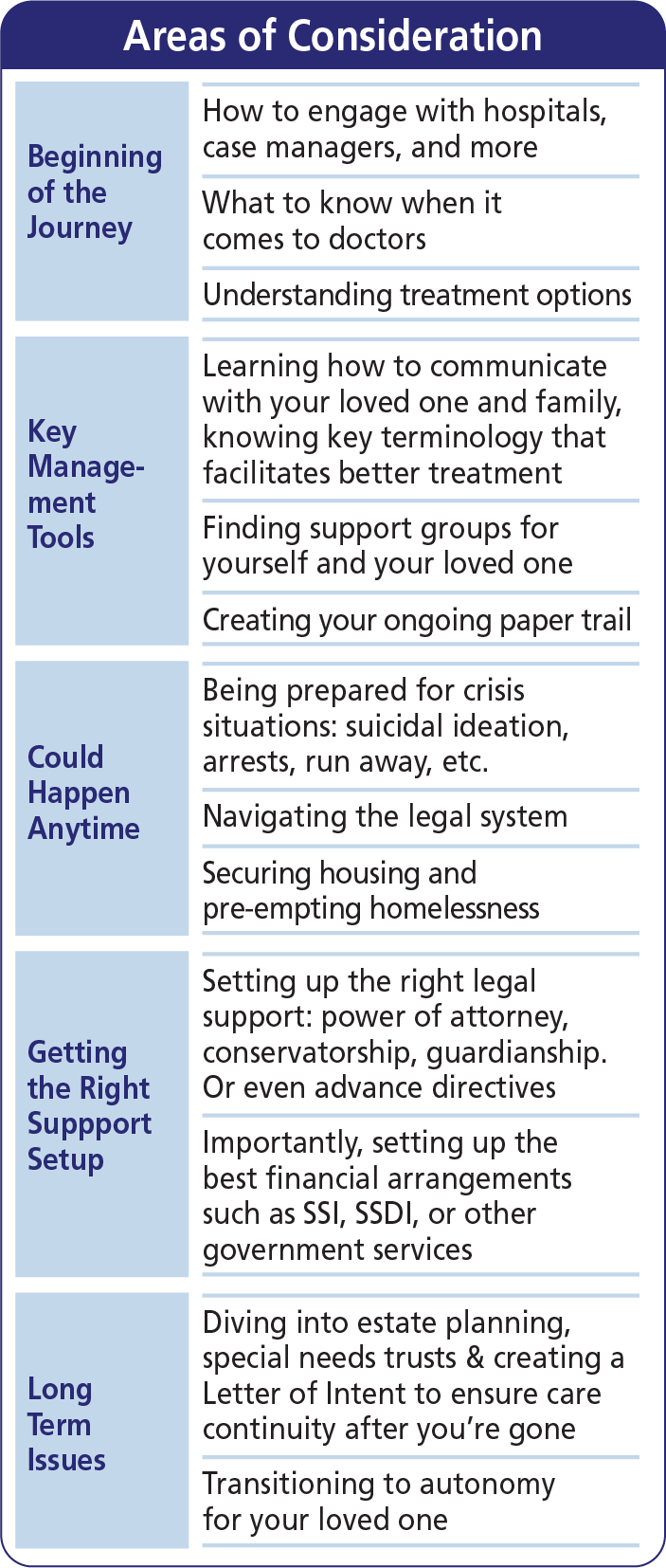
妮可-吉伦
Your SMI Roadmap
For a parent, navigating the challenges of serious mental illness (SMI), there is no roadmap. I learned this very early on when my child became sick with schizophrenia. I thought I understood how to work with doctors, follow the suggested treatment, and all would be well. But my child kept getting sicker, and she didn’t understand she was sick. Mental health professionals didn’t explain concepts like “anosognosia” to me or provide any clarity on the variety of symptoms she was experiencing. It was a murky, complicated, isolating, and frightening experience to figure out how to best help my child.
When dealing with serious mental illness, there is no typical or consistent path for the person with the illness, or the family trying to support them. The treatments are different, the issues are different, and to top it off – especially in the US – each state is different in how they might support or engage with the individual. The permutations and challenges in stabilizing and creating a path are endless and confusing. In the US, the lack of consistency across the country means everyone needs to figure out the following areas on their own:
- Healthcare and hospitalizations
- Assisted Outpatient Therapy (AOT) & judicial engagement
- Legal support issues
- Disability / financial support
- Insurance / Medicaid
- The interface with the legal system
- Government support programs
- And more…
There is a way, however, to get clarity on what you might need to do as a caregiver. The following chart distills the key areas that all caregivers (or individuals with the SMI) need to potentially address over the course of the illness. The rest of this article will break down each area of consideration:
Hospitalization is complex, but caregivers can take proactive steps before their loved one requires hospital care to drive optimal treatment. This includes establishing a thorough paper trail, compiling outpatient records, and maintaining essential documents like photos. To prevent a bad outcome, there are strategies to consider such as pursuing hospitalization as early as possible to minimize damage to the brain and requesting long-acting injectables instead of pills immediately after discharge from the first admission to ensure treatment adherence. Additionally, caregivers may find it beneficial to establish a rapport with local law enforcement in anticipation of potential crises resulting from psychosis.
Upon hospitalization, collaborate with case managers to navigate various aspects of care. This may involve strategizing with authorities, such as exploring Assisted Outpatient Treatment (AOT) or advocating for favorable judicial outcomes if law enforcement was involved. Insurance coverage, outpatient treatment plans, and medication management also come into play during this phase.
Following discharge, caregivers continue to advocate for their loved one’s well-being with medication management, treatment plans, housing, and supportive programs. Learning medical terminology and treatment options empowers caregivers to engage effectively with healthcare professionals, ask pertinent questions, and explore alternative care approaches.
Key Management Tools
Caregivers often face stigma surrounding serious mental illness when communicating with family and friends. Find resources and support networks to combat this isolation and foster understanding for both you and your loved one.
Understanding terms like anosognosia, a neurological condition that makes it difficult for people to recognize their own health problems or neurological deficits, is crucial. Grasping concepts such as positive, negative, and cognitive symptoms enable caregivers to explore diverse treatment options tailored to their loved one’s needs. This knowledge empowers caregivers in providing effective support.
Discovering the fundamentals for ongoing support of your loved one is vital.
Could Happen Anytime
The unpredictable nature of SMI can disrupt an individual’s path to recovery. Psychosis can emerge suddenly, often left untreated due to limitations in psychiatric hospitals and emergency rooms, which may dismiss crisis-stricken loved ones as not meeting the threshold of “dangerousness,” leading to dire consequences.
This could result in your loved one grappling with suicidal thoughts or fleeing due to auditory hallucinations. Alternatively, they may have encountered law enforcement during a psychotic episode, resulting in incarceration.
Regardless, it’s a crisis, and as a caregiver, you’re left scrambling to secure the necessary support for your loved one. Whether navigating the complexities of the legal system, seeking housing assistance, or accessing government programs, you need to be equipped with the knowledge and resources to navigate these challenges effectively.
Getting The Right Support Setup
Navigating disability-related services is far from straightforward, with each state imposing its own unique requirements and procedures. Whether you’re pursuing Supplemental Security Income (SSI) or Social Security Disability Income (SSDI), it involves navigating through various hoops and ensuring you have the information readily available for a successful application.
Caregivers also face barriers posed by the Health Insurance Portability and Accountability Act (HIPAA). Many medical professionals cite HIPAA as a reason for limiting communication with caregivers, necessitating the establishment of some form of legal proxy to advocate effectively on behalf of your loved one.
However, even more daunting is the process of obtaining legal support through mechanisms such as power of attorney, conservatorship, or guardianship. If your loved one is over the age of 18 and experiencing severe anosognosia (lack of insight) or if they acknowledge their illness but refuse legal assistance, securing these legal protections becomes even harder.
Long Term Issues
Caregivers want to pave the way for our loved ones to achieve their best possible outcomes. This is where a comprehensive estate plan becomes crucial, involving the establishment of a Special Needs Trust and a Letter of Intent. These measures ensure that whoever assumes the caregiving role after you’ve passed away understands how to continue supporting your loved one effectively.
Ideally, your loved one will eventually achieve self-sufficiency, capable of managing all Activities of Daily Living (ADL). Identifying any personal challenges they may face, as well as establishing a realistic budget, are vital steps to foster stability.
In Summary
Crafting a personalized roadmap if you’re living with schizophrenia, or for your loved one grappling with the illness, demands resilience, diligent research, access to information, and optimism. There’s a valuable resource available to offer consistent guidance, options, and support, no matter where you reside in the US with answers to these issues.
This resource comes in the form of a book titled “Schizophrenia & Related Disorders: A Handbook for Caregivers,” readily accessible on Amazon 和 Barnes & Noble. Interestingly, while the book was tailored with the US in mind, its insights extend beyond borders, addressing universal challenges associated with schizophrenia and related disorders.
Authored by Nicole Drapeau Gillen, a caregiver; this book serves as a comprehensive foundation for scenarios one might encounter. Whether you’re embarking on the journey of understanding your loved one’s needs or delving into long-term estate planning, the handbook equips you with essential information. Covering issues from initial diagnosis to long-term care, it serves as a reliable reference guide, offering insights to navigate the complexities of SMI caregiving.


